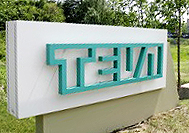Generic drugs giant Teva, one of the main beneficiaries of pharma’s years-long patent cliff, said it will lay off about 5,000 employees as it braces for the expiry of one of its own specialty brands.
Its lead drug, the blockbuster MS injection Copaxone, had sales of $3.6 billion last year, up 13% vs. 2011, according to IMS Health, but is set to lose patent protection next year. As the Israeli firm has diversified away from generics—specialty brands now account for about 40% of revenue—Copaxone’s loss of exclusivity highlights the pitfalls.
The layoffs, which amount to 10% of the workforce, are coming as part of an effort to decrease operating costs previously announced by CEO Jeremy Levin. The chief executive vowed to cut the fat after revenue slid 7.5% last year. Efforts also include divesting non-core assets.
The company said it now expects to realize approximately $2.0 billion in annual cost savings by the end of 2017, compared to what it said was a previously guided range of $1.5 to $2.0 billion. It expects to realize half of the annual cost savings (and complete the majority of the reduction) by the end of next year, and realize 70% of savings by the end of 2015.
Teva said it will prioritize “high-potential programs,” and will funnel initial savings from the restructuring into its complex generics and specialty pharma pipeline.
Company execs said sales of Copaxone, a daily injection, were likely to slide as more therapeutic options became available. The company has filed an sNDA for a three-times-a-week 40mg dose of the drug that could help extend the MS drug’s franchise. But it faces competition from other injection and infusion products—such as Biogen Idec’s Avonex, Bayer’s Betaseron and Pfizer’s Rebif—and increasingly from the newer orals: Biogen Idec’s Tecfidera, Novartis’s Gilenya and Sanofi’s Aubagio.








